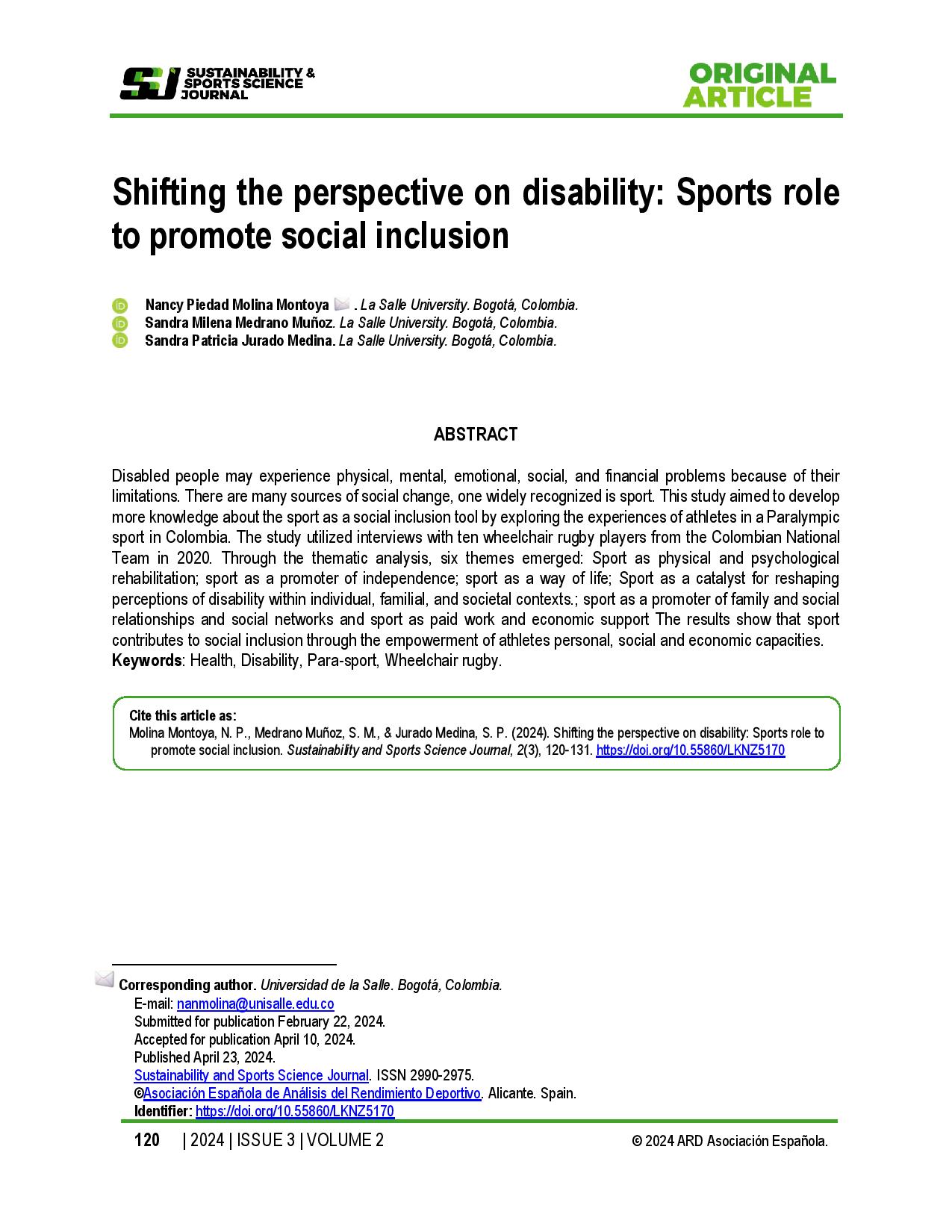Shifting the perspective on disability Sports role to promote social inclusion
Main Article Content
Abstract
Disabled people may experience physical, mental, emotional, social, and financial problems because of their limitations. There are many sources of social change, one widely recognized is sport. This study aimed to develop more knowledge about the sport as a social inclusion tool by exploring the experiences of athletes in a Paralympic sport in Colombia. The study utilized interviews with ten wheelchair rugby players from the Colombian National Team in 2020. Through the thematic analysis, six themes emerged: Sport as physical and psychological rehabilitation; sport as a promoter of independence; sport as a way of life; Sport as a catalyst for reshaping perceptions of disability within individual, familial, and societal contexts.; sport as a promoter of family and social relationships and social networks and sport as paid work and economic support The results show that sport contributes to social inclusion through the empowerment of athletes personal, social and economic capacities.
Article Details

This work is licensed under a Creative Commons Attribution-NonCommercial-ShareAlike 4.0 International License.
Funding data
References
Alvarez, M. & Ramírez, E. (2018). Disability and Sports in Social-Emotional and Social Inclusion Processes. International Journal of Psychiatry and Psychotherapy, 3, 1-10. Retrieved from [Accessed April 17, 2024]: https://www.iaras.org/iaras/filedownloads/ijpp/2018/031-0001(2018).pdf
Bailey, R. (2005). Evaluating the relationship between physical education, sport and social inclusion. Educational Review, 57(1), 71-90. https://doi.org/10.1080/0013191042000274196 DOI: https://doi.org/10.1080/0013191042000274196
Bantjes, J., & Swartz, L. (2018). Social Inclusion Through Para sport. Phys Med Rehabil Clin N Am, 29(2), 409-416. https://doi.org/10.1016/j.pmr.2018.01.006 DOI: https://doi.org/10.1016/j.pmr.2018.01.006
Braun, V. & Clarke, V. (2006). Using thematic analysis in psychology, Qual. Res. Psychol, 3:2, 77-101. https://doi.org/10.1191/1478088706qp063oa DOI: https://doi.org/10.1191/1478088706qp063oa
Camargo, D. & Forero C. (2018). La inclusión deportiva en Colombia: Una mirada desde los actores. Estudio de caso. Cuerpo, Cultura y Movimiento, 6(2), 143-165. https://doi.org/10.15332/s2248-4418.2016.0002.03 DOI: https://doi.org/10.15332/s2248-4418.2016.0002.03
Coalter, F. (2007). A Wider Social Role for Sport: Who's Keeping the Score? (1st ed.). Routledge. https://doi.org/10.4324/9780203014615 DOI: https://doi.org/10.4324/9780203014615
Corazza, M., & Dyer, J. (2017). A New Model for Inclusive Sports? An Evaluation of Participants' Experiences of Mixed Ability Rugby. Soc. Incl., 5(2), 130-140. https://doi.org/10.17645/si.v5i2.908 DOI: https://doi.org/10.17645/si.v5i2.908
Gobierno de Colombia (1991). Constitución Política de Colombia.
Garcia, M. E., Schwartz, S., & Freire, G. (2021). Disability Inclusion in Latin America and the Caribbean. World Bank, Washington, DC. https://doi.org/10.1596/36628 DOI: https://doi.org/10.1596/36628
Green, B. C. (2008). Sport as an agent for social and personal change. In V. Girginov (Ed.), Management of sports development (pp. 129-145). Oxford: Butterworth-Heinemann.
Gutiérrez, M., & Caus, N. (2006). Análisis de los motivos para la participación en actividades físicas de personas con y sin discapacidad. Rev. Int. de Cienc. Del Deporte., 1(1). https://doi.org/10.5232/ricyde2006.00204 DOI: https://doi.org/10.5232/ricyde2006.00204
Jaramillo, E. & Mejía, C. (2012). Boccias como elemento de inclusión social. Rev Col Med Fis Rehab, 22(2), 109-116. Retrieved from [Accessed April 17, 2024]: https://revistacmfr.org/index.php/rcmfr/article/view/58
Gobierno de Colombia. (1995) Ley 181. [Internet] Retrieved from [Accessed April 17, 2024]: https://www.mineducacion.gov.co/1621/articles-85919_archivo_pdf.pdf
Gobierno de Colombia (2000) Ley 582 [Internet] Retrieved from [Accessed April 17, 2024]: https://www.mineducacion.gov.co/1759/articles-86067_archivo_pdf.pdf
Marivoet, S. (2014). Challenge of Sport Towards Social Inclusion and Awareness-Raising Against Any Discrimination. PCSSR, 63(1), 3-11. https://doi.org/10.2478/pcssr-2014-0017 DOI: https://doi.org/10.2478/pcssr-2014-0017
Moore, M., Wilson, E., Campain, R., Hagiliassis, N., McGillivray, J., Graffam, J., & Bink, M. (2010). Measuring the social inclusion of people with a disability in Australia : the first national 1-in-4 poll. Research to Action' CADR Conference 2014 SCOPE for People with a Disability. Retrieved from [Accessed April 17, 2024]: https://asid.asn.au/wp-content/uploads/2022/04/Moore_et_al_Fri_1035_Systems40.pdf
Moya Cuevas, M. R. (2014). Deporte adaptado. N°5 Serie Infórmate sobre… Ceapat-Imserso.
WHO. (2023). Disability. WHO Website. Retrieved from [Accessed April 17, 2024]: https://www.who.int/es/news-room/fact-sheets/detail/disability-and-health
UN General Assembly, (2015). Transforming our world: the 2030 Agenda for Sustainable Development, 21 October 2015, A/RES/70/1. Retrieved from [Accessed April 17, 2024]: https://www.refworld.org/docid/57b6e3e44.html
Serrano, C., Ramírez, C., Abril, J. P., Ramón, L. V., Guerra, L. Y., & Clavijo, Nathali. (2013). Barreras Contextuales para la participación de las Personas con Discapacidad Física. Salud UIS, 45(1), 41-51.
Silver, H. (2015). The Contexts of Social Inclusion. DESA Working Paper No. 144. Department of Economic & Social Affairs. https://doi.org/10.2139/ssrn.2641272 DOI: https://doi.org/10.2139/ssrn.2641272
Ruiz, S. (2020). El Movimiento Paralímpico en Colombia, Importantes logros y grandes retos . Revista ImPARAbles, 2(1), 28-32.
ONU Mujeres, UNFPA y UNICEF (2022). Análisis De La Situación De Las Personas Con Discapacidad En Colombia 2021. UN Women office publishing: Colombia. Retrieved from [Accessed April 17, 2024]: https://colombia.unwomen.org/sites/default/files/2022-05/Discapacidad.pdf
Vargas, J., Muñoz, G. M., & Rincón, A. N. (2016). Manual Para Entrenadores De Rugby En Silla Deruedas O Quadrugby. USAID y Fundación Arcángeles. Retrieved from [Accessed April 17, 2024]: https://studylib.es/doc/7368358/manual-quadrugby




